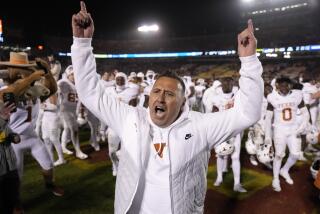Eyes of Texas Shine Upon Longhorns’ McWilliams : Cotton Bowl: Things were dim for Texas after last season’s 5-6 finish. Now, it plays Miami and has a chance to win national championship.
- Share via
DALLAS — The hiring of David McWilliams as football coach at Texas after the 1986 season was a major cause for celebration among the Longhorn faithful.
A former Texas player and assistant coach, McWilliams had the blessing of Darrell Royal, the school’s coaching legend in residence, something McWilliams’ predecessor, Fred Akers, never had.
But by the end of last season, the euphoria had worn off. The Longhorns had finished 5-6, their second losing season in a row, and--Royal man or not--McWilliams was on shaky ground.
“I felt like people wanted me to win, were pulling for me,” he said. “I was still in that grace period. But I knew it was getting shorter and shorter.”
As he spoke those words last week, McWilliams was chewing on an unlit cigar in a corner of a meeting room at Southern Methodist’s Ownby Stadium, where his third-ranked Longhorns were preparing for today’s Cotton Bowl game against No. 4 Miami.
Suffice to say that McWilliams is Texas’ favorite son again.
The Longhorns, 10-1 and outright champions of the Southwest Conference, will be playing in the Cotton Bowl for the first time since 1984 in a game that could, under the right conditions, produce this season’s national champion.
Should No. 1 Colorado lose to Notre Dame in the Orange Bowl and No. 2 Georgia Tech lose to Nebraska in the Citrus Bowl, the Cotton Bowl winner could move to the top of the final rankings.
Playing for No. 1 on New Year’s Day has become almost routine for Miami (9-2), which won three national championships in the 1980s.
But it is something Texas hasn’t experienced since Akers’ 1983 team carried an 11-0 record and a No. 2 ranking against Georgia in the ’84 Cotton Bowl, a game the Longhorns lost, 10-9, on a muffed punt in the fourth quarter.
From there, the Texas program plunged into mediocrity, and after the Longhorns went 5-6 in 1986, their first losing season in 30 years, Texas Athletic Director DeLoss Dodds fired Akers and hired McWilliams.
A center and linebacker on Royal’s 1963 national championship team, McWilliams had spent 16 years as a Texas assistant before becoming the head coach at Texas Tech for the ’86 season, and his return to Texas seemed to shake the cobwebs off the Royal era.
Unlike Royal, who had brought the Longhorns from 1-9 to 6-4-1 in his first season 30 years earlier, McWilliams was not an immediate success.
Looking back, McWilliams said he stepped into a situation in which the talent was almost threadbare.
Like other Southwest Conference schools, Texas had seen its recruiting base shrink in the mid-’80s because many of the state’s better high school players, put off by NCAA sanctions or the threat of them at SWC schools, were turning their backs on the conference.
But Texas also had been hurt, McWilliams found, by its own arrogance.
“We thought maybe guys were going to come just because we were Texas,” he said, “like all we had to do was walk in the door, and that wasn’t true any more. When I got here, we made a conscious effort to go by every high school with our hat in our hands.”
McWilliams indeed immediately made Texas a force again in the recruiting game, allowing the Longhorns to stockpile their share of the state’s top prospects.
He also brought in two of the college game’s most respected tacticians in offensive coordinator Lynn Amedee and defensive coordinator Leon Fuller after a 4-7 season in ’88.
But McWilliams’ third season at Texas was another nightmare, a 5-6 season in which the Longhorns lost four of their last five games, including a 50-7 defeat by Baylor at Austin.
As McWilliams searched for answers last January, his team held a players-only meeting.
In a no-holds-barred session, they decided that the team lacked discipline and focus, and they took that message to McWilliams, who, as it turned out, had come to a similar conclusion.
As a result, the off-season running program was changed. Instead of working out in separate groups in the afternoon, the entire Texas team ran three days a week at 6 a.m.
Also, weightlifting workouts were moved from the school’s Neuhaus-Royal Complex, a state-of-the-art training and dressing facility opened in 1986, to an old weight room inside Memorial Stadium.
“Running at 6 in the morning and lifting weights in the old facility, those were the two things that really got this team back on its feet,” said Brian Jones, the Texas middle linebacker who spent the first two years of his college career at UCLA. “I mean, you have to go to bed at 10 o’clock at the latest. It was tough at first. But everyone got used to it. Any time you go through something tough like that, you’re going to grow closer.”
At the same time, McWilliams, believing that he had retreated too far into his Xs and Os, made an effort to loosen up in his dealings with the players.
When the Texas campus was torn by racial tension last spring over the activities of two fraternities, he allowed the players to have a day off from practice to join fellow students in protesting the treatment of minorities on campus.
McWilliams plays down the decision, saying he did not consider team morale in making it. But as black and white Texas players took part in the protest, yet another bond was forged.
“Without us marching in that, there would have been tension among the players,” said defensive end Oscar Giles, one of the players who participated in the protest. “There was a tension growing in the university, and it was growing among us as well.”
Against this backdrop, the Longhorns produced a dream season, coming from behind in seven of their 10 victories. Their only loss came in their second game of the season, at home against Colorado, 29-22.
Should both Colorado and Texas win today and Georgia Tech lose, it can be argued that the national championship was decided by a series in the Texas-Colorado game in which McWilliams, his team holding a 22-20 lead early in the fourth quarter, rested every first-stringer on offense except quarterback Peter Gardere. After the patchwork unit ran three plays and punted, Colorado scored its go-ahead touchdown.
Still, no matter how this season’s rankings shake out, Texas will have enjoyed the kind of turnaround that could leave a lasting impression on the program. And with a new five-year contract and a nucleus of young talent, McWilliams can feel secure.
“We’re not going to have the same depth next season in all positions that we have now,” he said. “But I’ll be honest with you, these young guys saw what it took to get us here, and it wasn’t the physical (aspect of the game). They’ve got to have learned from it. I’ve got to have learned from it.”
More to Read
Go beyond the scoreboard
Get the latest on L.A.'s teams in the daily Sports Report newsletter.
You may occasionally receive promotional content from the Los Angeles Times.










